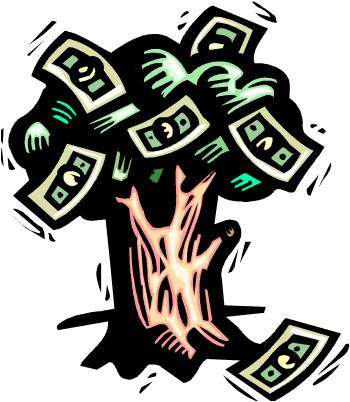Gross Domestic Problem: Don’t Shoot the Measurement
by Brian Czech
 A battle is brewing on the outskirts of the general public. A rising tide of quixotic activists is trying to overthrow a time-tested American institution. Like the Battle in Seattle, where the IMF was put on public trial, this new struggle will get a lot of attention, but the institution will remain.
A battle is brewing on the outskirts of the general public. A rising tide of quixotic activists is trying to overthrow a time-tested American institution. Like the Battle in Seattle, where the IMF was put on public trial, this new struggle will get a lot of attention, but the institution will remain.
The “institution” in this case is a metric: GDP, or Gross Domestic Product. But GDP isn’t any old metric, like widgets assembled or the price of potatoes. GDP is thoroughly institutionalized at the center of our domestic policy arena. When fiscal and monetary policies are crafted, each is judged according to the likely effects on GDP. If something will increase GDP, it must be good and will likely be adopted. GDP growth is the king of policy goals.
The central logic of pursuing GDP growth is “a rising tide lifts all boats.” As long as GDP continues to grow, it is mathematically possible to have more jobs and increase the amount of GDP available per person. In other words, the “standard of living” can increase with GDP.
The rising tide logic made perfect sense during most of the 20th century, when there was a lot of open water and plenty of boat-building material. But such is not the case in the 21st century. Growing the GDP entails population growth or growth in consumption per person; usually both. Trying to grow the GDP these days causes as many problems as it solves. Biodiversity loss, climate change, and pollution are some of the obvious ones. Noise, congestion, and stress are too. It doesn’t look like GDP growth increases the standard of living after all, unless your idea of living standards is particularly banal.

GDP measures environmental impact and the size of our economy, not its health. Photo Credit: Stephen Melkisethian
A more nuanced problem is that GDP growth is addictive, kind of like NFL football or World Cup soccer. It has societies and governments all over the world scrambling like hamsters to keep “the score” from shrinking. Crazy things are done in the name of GDP growth: huge rivers are dammed, Keystone pipelines are built, Supreme Courts kick people out of their homes. (Remember Kelo vs. New London?) A society hell-bent on GDP growth is like a junkie doing whatever nasty thing it takes for the next high, rather than doing the right thing for himself and his family.
Yet the realization is gradually spreading that GDP growth can’t continue forever. This reality is causing societal angst and discomfort. For many, especially in the economics profession and business world, the response is denial. “The world can, in effect, get along without resources” is how Robert Solow, the Nobel prize-winning economist, put it.
But among those with their feet firmly on the ground, seeing the limits to growth materialize, the responses aren’t always prudent either. One such response has been to shoot the measurer, or to be more metaphorically accurate, to shoot the measurement of GDP. The politics of this makes for some exceptionally strange bedfellows. From tree-hugging Earth Firsters to staid Austrian-school economists to think tanks funded by the Rockefeller Brothers fund, performing an exorcism of GDP from the spirit of our political economy is all the rage.
The motives of the GDP antagonists differ wildly, reminiscent of the NRA joining the ACLU to fend off the NSA. Pro-growth, free-market economists don’t like government getting any credit for anything, and GDP calculations include government spending, so GDP must be an evil spirit. On the other end of the spectrum, no-growth proponents who see the government as a force to defeat the pro-growth capitalists (and economists) think… something quite odd. They think that, if we refuse to even acknowledge GDP, we’re less likely to be obsessed with its growth, and we can focus more on healthier goals such as better education and healthcare.
It’s shoddy logic at best. It’s akin to an alcoholic thinking, “If I don’t count those beers I drink, I’m not as likely to drink so many. Then I can focus more on my book-learning and health.”
Shall we have a toast? Let’s drink to not counting those beers!
No, the fact is that the alcoholic needs to count those beers more than ever. The diabetic needs to monitor that blood sugar. The obese patient needs to monitor that scale. You get the picture: As our economy exceeds the capacity of the planet to sustain us and future generations, we need to monitor the size of our economy more closely than ever. And there is no better measurement of the size of our economy than GDP.
Due to the fundamental structure of the economy, the size of the economy – as measured by GDP – is a perfectly valid indicator of environmental impact. Agricultural and extractive sectors form the base, which must expand to support the growth of manufacturing and service sectors – yes even the “information economy.” This structure, which is the closest thing in economics to an inescapable law of physics, gives us the “trophic theory of money,” which says that the level of expenditure (GDP, in other words) is proportionate to environmental impact including such tangibles as biodiversity loss, climate change, and pollution in the aggregate.
Those who think technological progress can somehow decouple GDP growth from environmental impact haven’t thought hard enough about the relationship between technological progress and the GDP growth that was based on pre-existing levels of technology. The two go hand in hand, which again in the 20th century was a fine thing. The two going hand in hand in the 21st century tells us nothing except that technological progress cannot reconcile the conflict between economic growth and environmental protection.
So let’s not shoot the measurer or the measurement. Let our friends in the Bureau of Economic Analysis calculate GDP as consistently as they’ve done for over 80 years. They perform a valuable service, and GDP is an invaluable metric. Instead of shooting it, let’s help to ensure the appropriate attitude toward ever-growing GDP: that is, a growing sense of alarm and a concomitant determination to stabilize the size of this economic ship before it sinks as surely as the Titanic.





The difficulty withy the alcoholic analogy is that the vast majority of people don’t recognise that they have a ‘drink problem’ to begin with, that is, they don’t see anything wrong with the way things are going in relation to resource depletion and ecological damage – at least not enough to change their behaviour. So they’re not even thinking about counting the costs of their lifestyles. GDP reinforces this problem because growth in it has become synonymous with progress and economic good health.
Whilst you know and some others know that GDP tacitly gives a good indication of the level of environmental impact, when it is growing it more strongly gives a (possibly false) impression to most people that things are improving. So, an alternative measure that more obviously captures the inimical effects of certain economic activities could, if widely adopted, be more helpful than GDP in encouraging people to moderate their behaviour for the good of the planet.
This kind of commentary is much needed, as the dominant paradigm that unlimited economic growth can continue forever must be shot down, and seen for its suicidal implications, the sooner the better.
In a nutshell, the reason GDP is the wrong metric for the macroeconomy is that it maximizes material throughput, when what is needed is to minimize material throughput. What should be maximized instead are metrics that focus on the development of the economy, humans and the environment. Economic development focuses on quality of life issues, not base consumerism.
Kudos to Mr Czech for leading this battle, which urgently deserves to be at the top of any macroeconomic policy debate.
–Rick Casey
Lafayette, CO
Instructor, environmental economics, FRCC
It is not true that “the size of the economy – as measured by GDP – is a perfectly valid indicator of environmental impact”, or even of the economic activity. And, kind of strange to see a defense of the indicator just to give sense to the “no growth” proposition. “No growth” means declining rate of profits and, because of that, an inevitable fundamental change in the economic model.
As Mark Twain opined, “There are lies, damned lies, and statistics.” In this Orwellian world where nothing is what it seems and we are told the opposite of reality is the ‘truth,’ whether we have GDP or some other calculation as THE indicator of economic ‘prosperity’ may be moot. The statistics are so manipulated to be beyond ridiculous. With hedonic and seasonal ‘adjustments’ (or, better yet, number generated by faeries and unicorns), the departments of propaganda and ‘truth’ are in full swing in every government. A great example can be found with European countries that will be estimating the contribution of their ‘black markets’ (i.e. prostitution, illegal drug trade, etc.) to GDP (see this: http://olduvai.ca/?p=22490). And this doesn’t even consider the reification of numbers that we tend towards (i.e. giving the result of an extremely complex calculation a meaning/interpretation that just isn’t there)–of course, our compliant mainstream media only exacerbate the issue by focusing on such numbers (reporting only the government-sanctioned GDP and CPI). Quite simply, a number can mean anything depending on the lens through which it is viewed and our tendency to see these numbers as a reflection of a complex world is the problem. No number can EVER truly represent all the connections, feedback loops, and overall complexity of our world.
http://olduvai.ca
I think GDP is a poor proxy for environmental impact measurement. GDP is an incremental metric, it is a single year indicator, but most environmental impacts of significance are over longer periods of time building up from the past and affecting the future (e.g climate change but there are others too), the area under the GDP curve over longer periods is probably a better indicator but even so it includes both goods and bads, not just the bads.
An alcoholic will not change his behavior if you tell him you are drinking X beers a day, he probably already knows that. He might change his behavior if you measure the health of his liver which is a reflection of his history of drinking or show the picture of lungs to a smoker or show them other smokers lungs X decades ahead of them. Today we see the pictures and videos of damage to earth which is motivating many people to act. Can economists separate from GDP the good and the bad and show the split, so we can if overall GDP growth is coming from say degrowth of good and growth of the bad (what Herman Daly calls illth)?